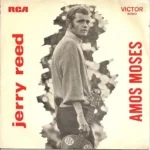 Jerry Reed’s 1970 hit “Amos Moses” remains one of the most delightfully offbeat and irresistibly funky songs to ever cross over from the country charts into the wider pop consciousness. At a time when country music was largely defined by heartbreak ballads, honky-tonk shuffles, and the emerging “Nashville sound,” Reed carved out his own swamp-soaked lane, blending country picking, bayou funk, and sly humor into a single three-minute tale about a one-armed alligator hunter from the Louisiana swamps. More than fifty years later, “Amos Moses” still feels like a bolt of lightning—an eccentric narrative and a groove that defies easy categorization, all driven by Reed’s virtuosic guitar work and mischievous grin. To understand why this song endures, you have to dive into the man behind it, the story he tells, and the wildly inventive musical landscape he created.
Jerry Reed’s 1970 hit “Amos Moses” remains one of the most delightfully offbeat and irresistibly funky songs to ever cross over from the country charts into the wider pop consciousness. At a time when country music was largely defined by heartbreak ballads, honky-tonk shuffles, and the emerging “Nashville sound,” Reed carved out his own swamp-soaked lane, blending country picking, bayou funk, and sly humor into a single three-minute tale about a one-armed alligator hunter from the Louisiana swamps. More than fifty years later, “Amos Moses” still feels like a bolt of lightning—an eccentric narrative and a groove that defies easy categorization, all driven by Reed’s virtuosic guitar work and mischievous grin. To understand why this song endures, you have to dive into the man behind it, the story he tells, and the wildly inventive musical landscape he created.
Jerry Reed was already a respected Nashville session guitarist and songwriter by the late 1960s, but he was far from a typical Music City figure. His picking style was a marvel—syncopated, funky, and infused with a percussive snap that made his acoustic and electric work instantly recognizable. Before “Amos Moses,” Reed had penned hits for others and scored a few of his own, including “Guitar Man,” which Elvis Presley famously covered, and “When You’re Hot, You’re Hot,” which would win him a Grammy. Yet Reed’s creative instincts always pulled him toward the unexpected. He loved rhythm and blues, jazz, and rock ‘n’ roll as much as straight country, and he had a knack for writing songs that felt like tall tales told around a backwoods campfire. “Amos Moses,” recorded for his 1970 album Georgia Sunshine, captured all those impulses in a single, unforgettable package.
The song’s narrative is pure Southern folklore. Reed introduces Amos Moses as the son of a Cajun mama and a man named Doc Milsap, born and raised in the Louisiana swamps. Right from the first line—“Well, Amos Moses was a Cajun, he lived by himself in the swamp”—listeners are pulled into a world of moss-draped cypress trees, murky waters, and dangerous wildlife. The details are vivid and just a little absurd: Amos is described as a one-armed alligator hunter, losing his limb to an alligator at a young age but growing up to become a fearless gator trapper. He’s a character who lives on the fringes of society, known to local law enforcement but never caught, a kind of swamp outlaw who thrives in his wild environment. Reed’s lyrics are delivered in a playful drawl, equal parts admiration and amusement, and the story unfolds like a folk legend set to a funky beat.
Musically, “Amos Moses” is a revelation. Built around a chugging, syncopated guitar riff that straddles the line between country and funk, the track grooves with an infectious energy that was virtually unheard of in mainstream country music at the time. Reed’s thumb-picking technique drives the rhythm, creating a percussive bass line with his thumb while his fingers snap off sharp, trebly accents on the higher strings. The result is a sound that feels swampy and urban all at once—like a meeting of Nashville pickers and New Orleans funk players on a humid summer night. The drums lay down a laid-back, second-line shuffle, while the bass locks in with Reed’s guitar to create a head-nodding pocket. There’s no fiddle or steel guitar here, no traditional country twang. Instead, the arrangement leans on groove and texture, with Reed’s voice acting as both storyteller and rhythmic instrument.
Reed’s vocal performance is a key part of the song’s charm. He doesn’t sing so much as he talks his way through the lyrics, emphasizing certain words with a sly wink or a knowing chuckle. His Georgia drawl gives the song a conversational feel, as if he’s sitting on a porch, spinning a yarn about a local legend while the band jams in the background. He rolls through the verses with confidence, throwing in little asides and rhythmic accents that keep the listener hooked. The chorus—“Amos Moses was a Cajun, he lived by himself in the swamp”—is simple but unforgettable, a sing-song refrain that invites everyone to join in. By the time Reed delivers the final line about Amos making his living “slappin’ them gators in the head with a stump,” the audience is grinning at the sheer audacity of the tale.
“Amos Moses” wasn’t just a quirky novelty; it was a commercial breakthrough. The single climbed to No. 8 on the Billboard Hot 100 and reached the Top 20 on the country chart, a rare feat for a song that sounded like nothing else on radio. It introduced Reed to a broader audience and helped solidify his reputation as a genre-bending innovator. The song’s success also paved the way for Reed’s later hits, including the Grammy-winning “When You’re Hot, You’re Hot” and his collaborations with Elvis and Chet Atkins. In the years that followed, Reed would become a beloved figure in both music and film, starring in movies like Smokey and the Bandit and writing more hits, but “Amos Moses” remained one of his signature achievements—a perfect encapsulation of his offbeat humor, technical brilliance, and fearless creativity.
Part of what makes “Amos Moses” so enduring is its refusal to fit neatly into any single genre. It’s often labeled as country, but the guitar riff owes as much to funk and R&B as it does to Nashville traditions. The rhythm section swings with a looseness more common in New Orleans than in Tennessee. Reed himself was a musical omnivore, drawing from whatever sounds inspired him, and “Amos Moses” captures that eclectic spirit. It’s the kind of song that could be played at a country bar, a rock club, or a funk jam session and still feel right at home. That genre-blurring quality helped the song find fans across musical boundaries and kept it sounding fresh decades after its release.
The song’s influence can be heard in countless places, from the swamp rock of Tony Joe White and Creedence Clearwater Revival to the country funk experiments of later artists like Junior Brown and Brad Paisley. Hip-hop producers have also sampled Reed’s guitar work, drawn to the gritty, percussive quality of his playing. In fact, “Amos Moses” has enjoyed a second life in the world of sampling, where its funky groove has been chopped and looped in tracks by artists far removed from the country tradition. This cross-genre appeal speaks to the song’s underlying power: a killer riff, a great story, and a performance so distinctive it can’t be confined to one musical box.
Culturally, “Amos Moses” captures a uniquely Southern sense of place and character. The swamp setting is almost a character itself, a mysterious and dangerous world where law enforcement fears to tread and nature rules supreme. Reed’s portrayal of Amos as a lovable outlaw taps into a long tradition of American folk heroes, from Jesse James to Huck Finn—figures who live outside the law but command respect for their independence and cunning. At the same time, the song is free of moralizing. Reed doesn’t present Amos as a villain or a hero; he’s simply a fascinating character living life on his own terms. That ambiguity gives the story depth and allows listeners to project their own interpretations.
Listening to “Amos Moses” today is a reminder of how fearless and inventive Jerry Reed was as an artist. In an era when radio formats were rigid and genre lines tightly policed, he made a record that ignored the rules and became a hit anyway. The song’s combination of technical mastery and playful storytelling reflects Reed’s broader career, which was full of surprises and marked by a restless creativity. He was a world-class guitarist, a gifted songwriter, and a natural entertainer, and “Amos Moses” showcases all those talents in a single track.
The legacy of “Amos Moses” continues to grow with each passing generation. Younger listeners discover it through film soundtracks, classic rock radio, or online playlists, marveling at its funky groove and vivid narrative. Guitarists study Reed’s playing, trying to replicate the complex thumb-picking patterns that drive the song. Fans of outlaw country and Americana embrace it as a precursor to their own genre-defying sounds. Even casual listeners, hearing it for the first time, can’t help but be drawn in by its infectious rhythm and colorful story.
Ultimately, what makes “Amos Moses” so special is the way it captures the essence of Jerry Reed himself: fearless, funny, and endlessly creative. It’s a song that invites you into a world both strange and familiar, a place where alligators lurk, sheriffs chase ghosts, and a one-armed Cajun hero lives by his wits. It’s a song that swings and struts, that makes you laugh and tap your foot, that sounds as fresh in a modern playlist as it did when it first hit the airwaves in 1970. “Amos Moses” is more than a novelty or a hit single—it’s a testament to the power of great storytelling and even greater musicianship. Jerry Reed may have sung about a man who lived deep in the swamp, but with this track, he brought the swamp to the world and proved that a truly fantastic groove knows no boundaries.


